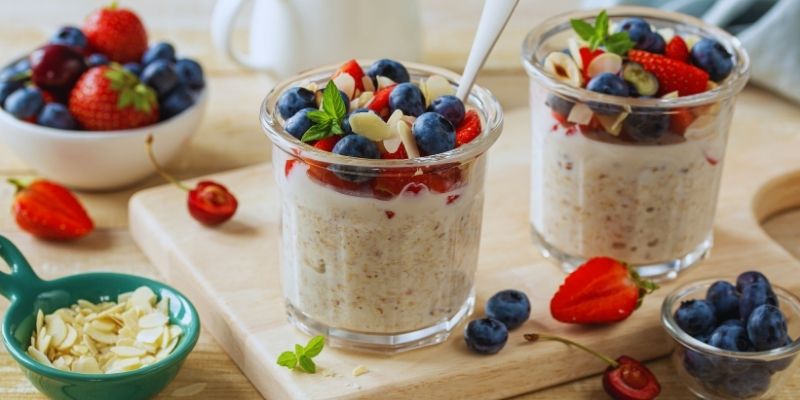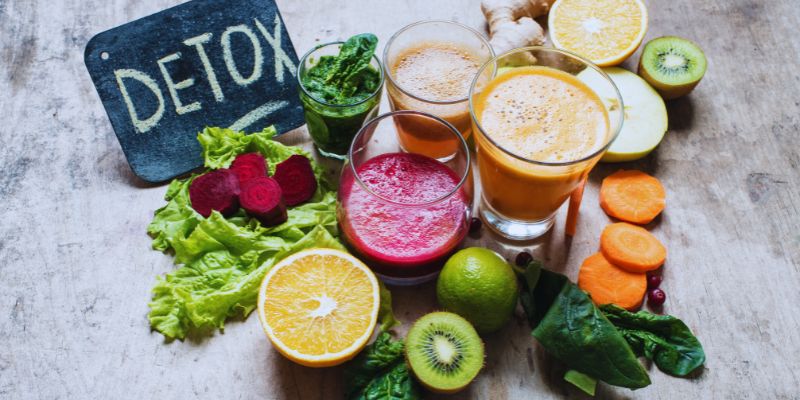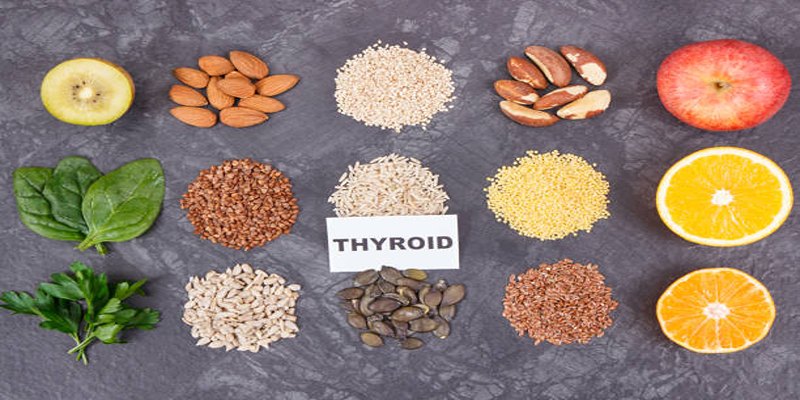Pollutants, heavy metals, and processed foods, which negatively impact your body, are all toxins. Though the human body removes toxins through sweating and internal systems (of which the liver is a major part), certain foods also facilitate the process. Yes, you heard it right!
Detox foods (onion, turmeric, beetroot, avocados), which are rich in antioxidants, minerals, fiber, and vitamins, help to detoxify your body effectively. They promote better digestion, boost energy levels, and improve skin. You can add these foods to your diet to support your body's natural detoxification process. But before having detox foods on your dinner plate, why not learn a little about them here?
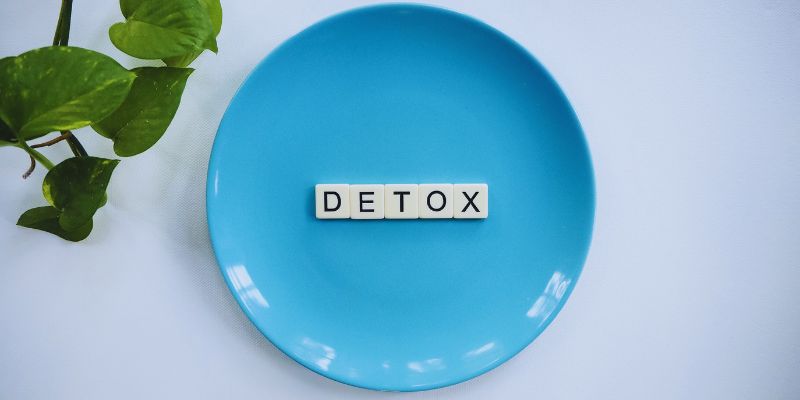
Best Foods That Detox Your Body
One of the most important organs in the body, the liver's main job is to purify the body by processing different nutrients, filtering your blood, and turning toxins into waste materials. Certain foods can also help the liver in cleansing your body. Let's learn about those foods here that detoxify the human body:
Onions
This common kitchen essential is not only delicious but also nutritious. Onions contain health advantages, containing quercetin, allicin, and several additional antioxidant polyphenols. The onions have more average polyphenols than tomatoes, carrots, red bell peppers, garlic, and other allium vegetables. These substances aid in defending the body against oxidative stress. It has an abundance of sulfur-containing amino acids that effectively cleanse the liver. The health benefits of onions are greatest when they are raw. Peel off as little onion as possible because the beneficial chemicals are most potent in the outermost layers.
Turmeric
Turmeric is the yellow-colored spice that gives food its vibrant color. However, turmeric has remarkable health advantages as well. Its yellow hue is due to the presence of curcumin, the active component of turmeric. In traditional medicine, curcumin is frequently used to treat gastrointestinal and liver issues. The main advantage of turmeric is that it has anti-inflammatory properties that promote robust immune function. Turmeric reduces fatty acids, promotes neurological wellness, and may prevent esophageal and colon cancer. Detoxification is another benefit of turmeric. It improves bile circulation, which aids the liver in the removal of waste products and poisons. Turmeric is an antioxidant-rich spice with no negative side effects, defends the body, and fights disease more efficiently than medication-based treatments.
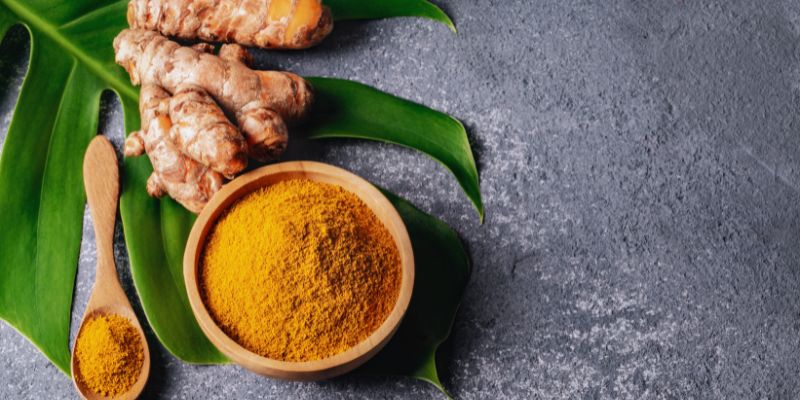
Flaxseeds
Prebiotics, a fiber that supports good gut flora, are abundant in flaxseeds. Prebiotics allow gut bacteria to flourish, while probiotics help them grow again. It aids in the regular elimination of waste and the metabolism of estrogen in the body. The fiber also helps to maintain regular bowel movements. Alpha lipoic acid (ALA), one of the omega-3 fatty acids found in flaxseeds, has anti-inflammatory properties. It may enhance hemoglobin levels, reduce cholesterol, and ease mild discomfort associated with menopause. The powdered form has a greater health benefit than whole flaxseed since it digests more readily.
Beetroot
Nothing is more beneficial than beetroot for people needing a quick nutritional boost. Plant-based colors called betalains, which have potent anti-inflammatory and antioxidant properties, are responsible for their vivid hue. Rich in vitamin C, iron, and magnesium, the vegetable is currently praised as a superfood because of its numerous known health advantages. Beetroot is an excellent detox food since it can boost the cleansing of the liver and is excellent for skin and hair. It also reduces cholesterol levels. Additionally, beets contain a lot of nitrates, which your body transforms into nitric oxide. This chemical relaxes your blood vessels. As a result, blood flow may be enhanced, and blood pressure may be reduced. Continuous beet consumption may assist you in combating cancer, lessen arthritic pain, improve your brain function, and shed weight. Beets are great all-around body purifiers since they also increase the body's cellular oxygen ingestion. When pollutants get back into the body, many detox regimens fail because the toxins do not completely exit the body.
Blueberries
Despite their small stature, blueberries have a powerful nutritional impact. They are among the world's best sources of antioxidants. Anthocyanins, a class of antioxidants with antibacterial and anti-inflammatory properties, are responsible for their rich blue color. As antioxidants, anthocyanins aid in destroying free radicals, which are harmful substances connected to the onset of cancer, heart disease, and Alzheimer's disease. The natural aspirin included in blueberries assists in minimizing discomfort and the tissue-damaging consequences of long-lasting inflammation. Blueberries also have proanthocyanidins, which are super-detoxifying phytonutrients and have antimicrobial qualities. Blueberries are also good for your digestive system because of the substantial amount of fiber they contain. Fiber supports the removal of pollutants.
Avocados
Rich in antioxidants, this fruit helps your body combat radical damage, decrease cholesterol, and widen blood vessels while preventing toxins that can ruin arteries. Avocados are an excellent source of nutrients that help lower the chance of cardiovascular disease, diabetes, and weight gain since they contain about 20 vitamins and minerals. Glutathione, another avocado vitamin, helps the liver cleanse artificial toxins and prevents at least 30 distinct cancers. Research found that high glutathione levels in older adults were associated with better health and a lower risk of arthritis. Higher "good cholesterol" levels and a decreased risk of metabolic syndrome are all linked to eating avocados.
Cabbage
Many people have turned to the cabbage soup diet to drop weight while staying in shape. However, cabbage is a great detoxifying food and weight loss aid. Sulforaphane, a substance found in cabbage and most cruciferous vegetables (such as broccoli), aids the body's defense against pollutants. Additionally, cabbage provides the body with glutathione, an antioxidant that enhances the liver's detoxification capabilities. The most well-known use of sulforaphane is for its anti-cancer effects. Cruciferous vegetables are also rich in fiber, which aids in the removal of toxins from your colon through your stool. Indole-3-carbinol, which is found in cabbage and other leafy crops, promotes DNA restoration in cells and seems to inhibit the formation of cancer cells.
Ginger
Ginger, along with turmeric, is one of the most powerful spices in the globe for preventing disease. Ginger has some acidic qualities, boosts the efficiency of the liver, increases metabolism, and eliminates waste or detoxifies your body. In addition to being excellent in relieving nausea, ginger can also aid with digestion, abdominal discomfort, and gas reduction. Ginger also helps strengthen the immune system. Consider drinking ginger tea or incorporating freshly shredded ginger into fruit or vegetable juice to aid digestion. Furthermore, you might discover that adding it to hot water improves its flavor. Getting it into your body in any manner can help, particularly if you have a fatty liver or consume too many harmful foods and beverages.
Conclusion:
By eliminating toxic waste and encouraging better digestion, skin, and mental alertness, detoxification can help restore equilibrium to your body's natural processes, promote organ performance, and enhance general health. It's critical to realize that detoxification doesn't call for drastic diets or fast remedies; long-term advantages come from a balanced strategy incorporating complete foods. You may improve mental clarity, live a more vibrant, energized life, and boost your body's health by drinking plenty of water and eating detox-friendly foods. Generally speaking, sustaining one's health and well-being requires consuming a nutritious diet, taking care of oneself, and engaging in physical activity.

